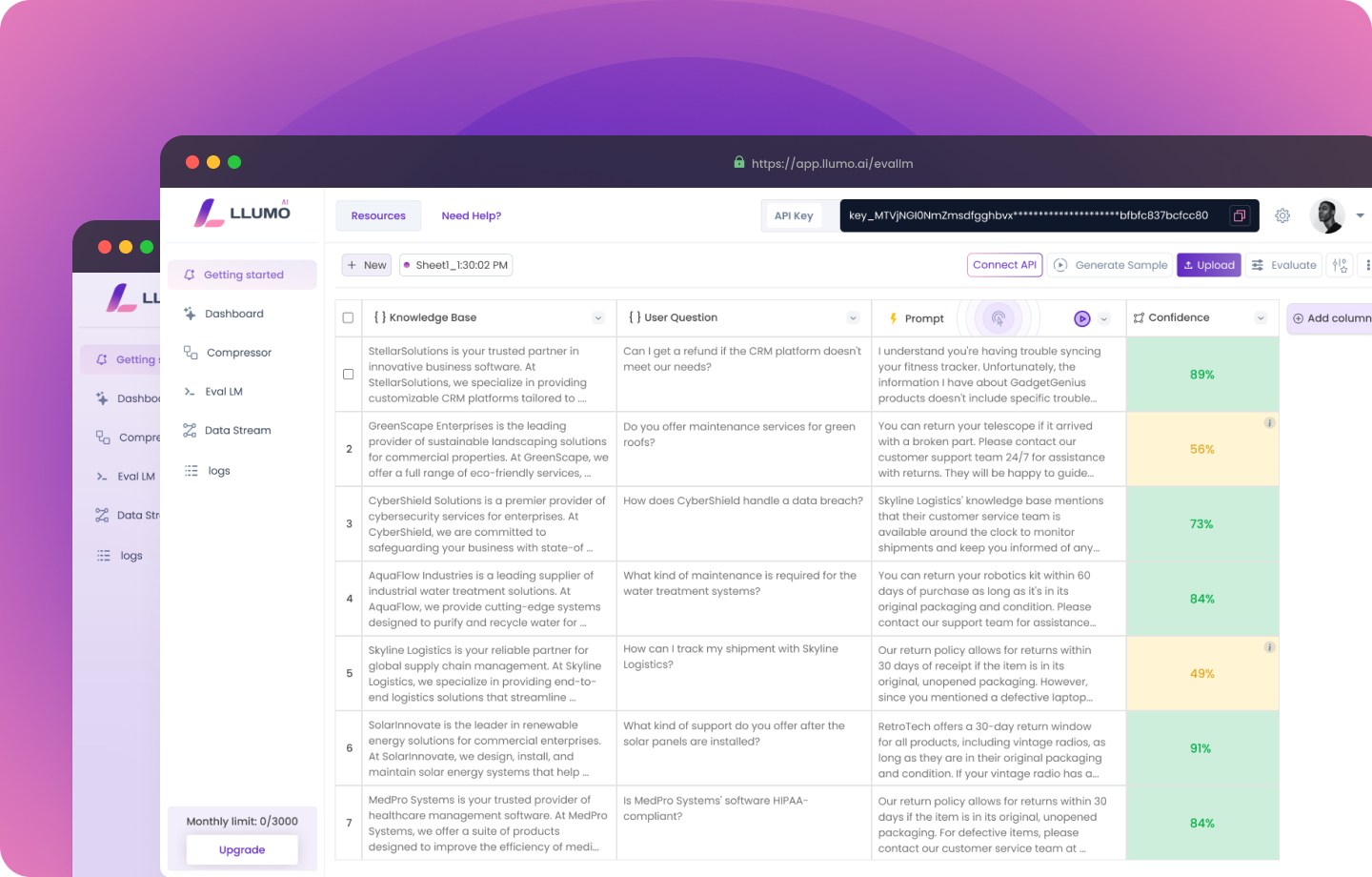

Installing Necessary Libraries
This cell installs or upgrades the necessary Python packages for the project:- google-cloud-aiplatform: The Google Cloud AI Platform SDK, used for interacting with Vertex AI.
- requests: A popular HTTP library for making API calls (will be used for the Llumo API).
- nltk: Natural Language Toolkit, a leading platform for building Python programs to work with human language data.
- beautifulsoup4: A library for pulling data out of HTML and XML files, useful for web scraping.
Setting Up VertexAI
This cell mounts your Google Drive to the Colab environment:- It imports the
osmodule for operating system operations and the drive module fromgoogle.colab. drive.mount()attaches your Google Drive to the ‘/content/drive’ directory in the Colab environment.force_remount=Trueensures that the drive is remounted even if it was previously mounted, which can help resolve connection issues.
- It sets the
GOOGLE_APPLICATION_CREDENTIALSenvironment variable to point to your Google Cloud service account key file. - The file path suggests that your credentials JSON file is stored in your Google Drive under the ‘MyDrive/vertex/’ directory.
- This step is crucial for authenticating your script with Google Cloud services.
Importing Libraries
This cell imports all necessary Python modules:os: For operating system operations and environment variables.requests: For making HTTP requests (will be used for Llumo API calls).json: For JSON parsing and manipulation.logging: For setting up logging in the script.getpass: For securely inputting passwords or API keys.aiplatform: The main module for interacting with Vertex AI.TextGenerationModel: Specific class for text generation tasks in Vertex AI.
Setting up Basic Logging
This cell sets up logging for the script:logging.basicConfig()configures the logging system with INFO level, meaning it will capture all info, warning, and error messages.logger = logging.getLogger(__name__)creates a logger object.__name__is a special Python variable that gets set to the module’s name when the module is executed.
Setting up Llumo API
This cell securely handles the Llumo API key:- It uses
getpass()to prompt for the Llumo API key without displaying it on the screen as it’s typed. - The API key is then stored as an environment variable named ‘LLUMO_API_KEY’.
- This approach keeps the API key secure by not hardcoding it in the script.
Define Llumo compression function
Function definition:
- We define a function
compress_with_llumothat takes a text input and an optional topic.
API setup:
- We retrieve the Llumo API key from environment variables.
- We set the API endpoint and prepare headers for the HTTP request.
Payload preparation:
- We create a payload dictionary with the input text.
- If a topic is provided, we add it to the payload.
API request:
- We use
requests.post()to send a POST request to the Llumo API.response.raise_for_status()will raise an exception for HTTP errors.
Response parsing:
- We parse the JSON response and extract the compressed text and token counts.
- We calculate the compression percentage.
Error handling:
- We use a try-except block to catch potential errors:
- JSON decoding errors
- Request exceptions
- Unexpected response structure
- If an error occurs, we log it and return the original text with failure indicators.
Return values:
- The function returns a tuple containing:
- Compressed text (or original if compression failed)
- Success boolean
- Compression percentage
- Initial token count
- Final token count
Define example prompt and test without compression
Defining the prompt:
- We create a detailed prompt about photosynthesis. This serves as our example text for compression.
Testing without compression:
- We use the VertexAI client to send a request to the text-bison model.
- The messages parameter follows the chat format:
- A system message sets the AI’s role.
- A user message contains our prompt.
Displaying results:
- We print the AI’s response to the prompt.
- Vertex AI doesn’t provide any token usage. So, it’s not possible to print token usage for checking.
Test with Llumo compression
Applying Llumo compression:
- We call compress_with_llumo() with our example prompt.
- The function returns multiple values, which we unpack into separate variables.
Checking compression success:
- We use an if statement to check if compression was successful.
- If successful, we print compression statistics: percentage, initial and final token counts.
Using the compressed prompt:
- If compression succeeded, we use the compressed prompt in our API call to vertexAI.
- We use the same message structure as before, but with the compressed prompt.
Displaying results:
- We print the AI’s response to the compressed prompt.
- We print the number of tokens used with the compressed prompt.
Handling compression failure:
- If compression fails, we print a message indicating this.
- In a real application, you might want to fall back to using the original prompt in this case.